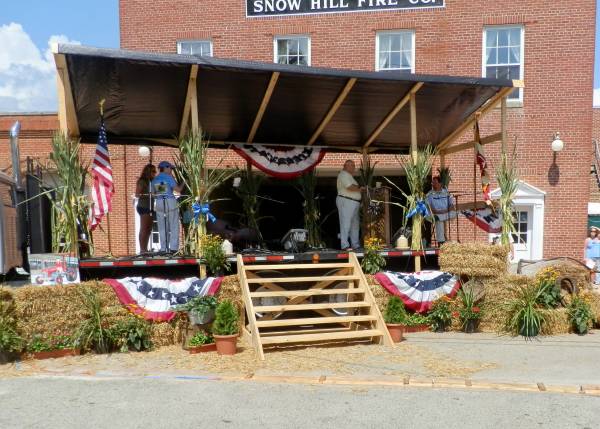There's just so much to see and so much to do!
Steve Hales did such a wonderful job and certainly entertained the crowd. He's a great auctioneer too!

Blessing of the Combines-Snow Hill, MD 8-4-2012
by Delegate Michael A. McDermott
Let us recall our humble beginnings.
There are homes here in town that were standing and full of life when our founders reached into their bag of seed and sowed independence into the hearts of their countrymen. Men and women stood on these very streets and saw the dawn of liberty. They would pledge everything to secure a hope and a future so that we could be a free people.
We are that posterity which was declared in the preamble of our Constitution and now the task of passing on "life, liberty, and the pursuit of happiness" rests with our generation just as it was declared and passed down to us. It is a sacred trust.
Let us thank God today that many present here with us pursue their happiness while operating a combine. They do so in an ever changing environment full of risks and challenges. They are the original conservationists who clearly have a dynamic relationship with the land that is both historic yet always with an eye toward the future. It comes as no surprise that many of the original delegates to the First Continental Congress were farmers. They were men of shared vision and a passion for the land.
Maryland, from the beginning, has recognized the importance of farming to our economic well being as a people. It is for good reason that you find a farmer and a fishermen on the Great Seal of the State of Maryland, and it should serve as a constant reminder to all of the importance these two occupations played in the founding of our state.
We must do all that we can to preserve the right to farm for in doing so, we preserve ourselves.
It is time for a new generation of sowers to rise up that we might preserve liberty for all of our tomorrows. Change is needed if we are to expect farming to remain viable in Maryland. We must demand a regulatory environment that is reality based and governed by the Department of Agriculture and not the Department of the Environment.
We must demand that, before they are implemented, all further regulations and permitting practices take into account the full impact on our farming communities including their long term economic viability. And while the Eastern Shore takes care of our 4% responsibility for the health of our Bay, we must insist that Baltimore City and the metropolitan counties take a hard look in the mirror for the other 96%.
We must insure that those who choose to pass on their farming traditions can do so without the fear of their land being lost by crushing tax liabilities..and we must demand that taxpayer funded law school clinics do not terrorize our farm families. The attacks on our farming traditions must end now.
Every child in Maryland should be required to take a field trip to a family farm. Our culture must be viewed as something more than the fields and barns they drive by on their way to the beach. The children of Maryland need to know that their food does not originate in a grocery store. Education and liberty walk side by side and hand in hand.
I want our young people to know that there is a hope and a future for farming in America and especially on the Eastern Shore. I want them to embrace new and innovative technology and techniques just as those who have gone before them have done throughout history. We are the breadbasket of the world and our farmers lead the way.
In our midst today are tomorrow's farmers. Their hopes and dreams are precious and insure that our own future is secure and prosperous. Today, let us determine to do all we can to protect those dreams. Let us insure that the blessing of the combines does not become a parade of antiques that we dust off once a year to remind ourselves what life use to be like on the Eastern Shore.
Let us stand together today with our farming brethren and again sow the seeds of freedom that will insure that our children’s children have the opportunities of life, liberty, and the pursuit of happiness all the days of their lives.
May God Bless Maryland."









 Simmons, who turns 84 next month, is doing his part by donating every single apple, pear, peach and cherry from his modest orchard atop Irons Mountain to the Salvation Army in Cumberland. Salvation Army volunteers distribute more than 30,000 pounds of fruit from the Simmons orchard each year.
Simmons, who turns 84 next month, is doing his part by donating every single apple, pear, peach and cherry from his modest orchard atop Irons Mountain to the Salvation Army in Cumberland. Salvation Army volunteers distribute more than 30,000 pounds of fruit from the Simmons orchard each year.


